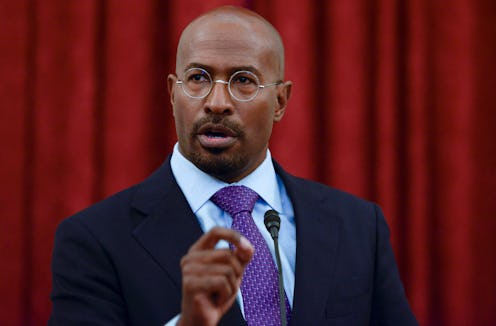It's difficult to watch legacy media try and cover the election results right now. It seems as though the landscape is polarized between sources still reeling from how wrong they were in their election predictions and sources celebrating victory while failing to make space for unity to exist, in spite of their candidate's calls for it. One commentator providing an oasis in the midst of confusion, nationalist pride, and fear is CNN's Van Jones. He was on hand until the wee hours of Wednesday morning, while quiet horror set in across multiple news outlets. He bravely tackled the complicity of white America in upholding white supremacy on election night, hours before that graphic of the racial vote split went viral. He held his conservative counterparts accountable for their complicity in spreading fear and turmoil following election night. And he called for denizens of America to interact more compassionately than his colleagues were.
First, in a clip that immediately inspired its own hashtag, Jones framed the confusing election results through the lens of discontented white folks punishing America for choosing to instate a black president for eight years. It was a white backlash, as he saw it, against a rapidly diversifying population and the desire for leadership to reflect that diversity. The progressive push to center people of color in an effort to dismantle white supremacy caused white folks content with the status quo to fight extra hard in an effort to silence those voices once again.
Said Jones in the clip:
We've talked about everything but race tonight. ...This was a white-lash. This was a white-lash against a changing country. It was a white-lash against a black president, in part. And that's the part where the pain comes. And Donald Trump has a responsibility tonight to come out and reassure people that he is going to be the president of all the people who he insulted and offended and brushed aside, yeah.
When you say you want to take your country back — you've got a lot of people who feel that we're not represented well either! But we don't want to feel like someone has been elected by throwing away some of us to appeal more deeply to others. So this is a deeply painful moment tonight. I know it’s not just about race — there’s more going on than that — but race is here too, and we got to talk about it.
In another clip, he clapped back at conservative pundit and Trump supporter Kayleigh McEnany, telling her as she interrupted him, "I'm not finished and I'm not going to be talked over tonight."
“You guys won, and you need to back off," Jones advised in a heated moment, imploring the conservative panelists to check their smugness and indignation against Clinton supporters.
"You need to have a little bit of empathy and understanding for people who are afraid, because your candidate has been one of the most explosively provocative candidates in the history of our country. And there’s a price to be paid for that," he continued. "If you want unity, we have to hear the pain first before you tell people they’re wrong to hurt.”
Eventually, though, even Jones reached his breaking point, calmly telling former Trump Campaign manager Corey Lewandowski he was "being a horrible person right now" after trying to address a question Anderson Cooper had posed to him multiple times to interruption.
"Corey, you won," Jones acquiesced, trying to make his point.
"So where is the conciliatory note to say I want my people to support one president?" Lewandowski fired back, demanding to know why Clinton wasn't conceding at 2 a.m. on Wednesday. "Where's that message?"
"It's got to start with you, man," Jones replied in an attempt to encourage Trump supporters to make space for mourning progressives. "This is the fear, here it is, you see it. You won."
"Say it again, I didn't hear you," Lewandowski interrupted.
"Look, it's two o'clock in the morning," Jones began, "[Clinton] will talk in the morning."
"Will she?" Lewandowski interrupted again.
"Corey, you're being a horrible person right now. Let me finish," Jones replied. He was finally able to add:
I want every parent at home who's up right now trying to figure out how are we going to get through this — where is the grace going to come from? Where is the understanding, where is the empathy going to come from? It's going to have to come from ordinary people. Tomorrow at work, when we go and look at people who we don't agree with, this can't be the interaction.
A willingness to listen to people who are hurting have always been markers of the emotional intelligence that fuel progressive ideals. It's not surprising that the same call to make space for those who have been historically oppressed and erased, brought forth now and suggested to those celebrating a Trump victory, is still being silenced by the victors.
